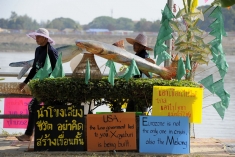PR - Regional Cooperation Needs Resuscitation At Mekong Summit
Leaders Must Take Stand Against Mainstream Dams
Ho Chi Minh City, Vietnam: On Saturday, the Prime Ministers of Cambodia, Laos, Thailand and Vietnam, are expected to meet for the 2nd Summit of the Mekong River Commission (MRC) in Ho Chi Minh City. The Summit comes at a critical moment when regional cooperation and the Mekong River are on the brink of collapse. Laos is unilaterally moving forward with the construction of the Xayaburi and Don Sahong dams on the Lower Mekong mainstream, while disregarding its responsibilities to the 1995 Mekong Agreement and repeated calls from neighboring countries for further study and consultation. Regional leaders must use this Summit to demand the immediate halt to construction on these projects and the cancellation of further plans to build dams on the Mekong mainstream.
“To date, the MRC has failed to address the rising danger posed by the rogue Lao regime. Meanwhile Laos has become emboldened by the MRC’s inertia, steamrolling its neighbors in order to further its own unilateral agenda on the Mekong,” said Ms. Ame Trandem, Southeast Asia Program Director for International Rivers. “It’s critical that the dangers of mainstream dam building take center stage at the 2nd Mekong Summit. Mekong leaders must use this opportunity to condemn the current state of regional cooperation and finds new ways to approach decision-making related to dams on the Mekong River.”
The MRC’s First Mekong Summit in 2010 produced the Hua Hin Declaration, which reaffirmed political commitments towards the protection of the Mekong River and the implementation of the 1995 Mekong Agreement. However since then, transboundary governance has faced political gridlock and procedural dispute between MRC member countries over whether to build the Xayaburi and Don Sahong dams. During regional deliberations, Laos has refused to cooperate in good faith, rejecting repeated requests by Cambodia, Thailand and Vietnam to carry out transboundary impact assessments of the dams and refusing to allow discussions by the MRC’s Council to progress.
“It’s been four years since the MRC’s Hua Hin Declaration and rather than taking steps forward in the sustainable management of the Mekong River, we have taken a leap backwards, leaving the region at even greater risk,” said Ms. Painporn Deetes, Thailand Campaigns Coordinator for International Rivers. “The MRC requires significant reform if there is to be hope for the Mekong River. We call on regional leaders to demand that construction on the mainstream dams stop immediately, address the ambiguities of the Agreement, and put in place a mechanism to ensure enforcement, before its is too late for Mekong River.
Urgent warnings from scientists have demonstrated the dangers posed by the construction of dams on the Mekong mainstream, including the serve threats to the region’s fisheries and the food security of millions who depend on the Mekong. In 2010, a MRC commissioned Strategic Environmental Assessment recommended a ten-year deferment to decisions over whether to build the mainstream dams due to their significant environmental, economic, and social risks and the need for further study.
The proposed dams have also faced massive international public opposition over the years. Since 2009, tens of thousands of people have submitted petitions and letter to the region’s prime ministers and the MRC calling for the Mekong River to remain free flowing. Over the past weekend, hundreds of Cambodians participated in boat flotillas calling for the cancellation of the Don Sahong Dam. On Monday, 39 NGOs issued a declaration demanding a stop to the Xayaburi Dam and on April 4th, the Save the Mekong coalition will hold a panel discussion in Ho Chi Minh entitled “The Journey from Hua Hin to Ho Chi Minh City and the Future of the Mekong River,” highlighting the urgent need for regional leaders to take action for the future of the Mekong. There will also be a press conference on Friday in Bangkok at the Thai Journalists Association focusing on the Mekong dams.
“The 1995 Mekong Agreement recognizes the immense value of the Mekong River Basin to all riparian countries,” continued Ms. Trandem. “Under the Principal of Cooperation, parties agree, ‘to protect the environment, natural resources, aquatic life…and ecological balance of the Mekong River Basin.’ It is critical that Mekong leaders uphold the spirit of the 1995 Mekong Agreement and issue a declaration condemning dams on the Mekong mainstream. If the Summit becomes nothing more than a public relations exercise at the expense of the millions of people in the Mekong region who depend on the river, the international community must work with leaders to find a new platform for regional cooperation and improved decision-making on the mainstream dams.”
- Painporn Deetes, Thailand Campaign Coordinator, International Rivers: T: +66814220111, E: pai@internationalrivers.org
- Ame Trandem, Southeast Asia Program Director, International Rivers: T: +66 868 822 426, E: ame@internationalrivers.org
- Xayaburi Dam Media Kit
- Don Sahong Dam Media Kit
- A Save the Mekong Panel Discussion on April 4th in HCMC



